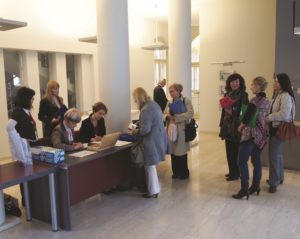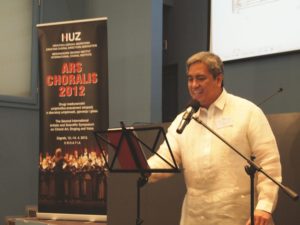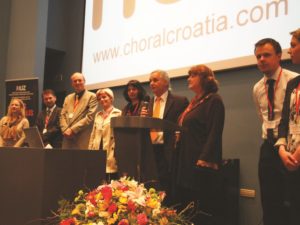Andrea Angelini, ICB Managing Editor and choral conductor
The first question that comes to mind when you meet Branko Starc is, how in the world does he do it? How does this man, this eclectic musician, manage to invent and to organize so professionally a symposium of choral music? We all know that the difficult times in which we are living are certainly not supportive of artistic events, especially musical ones; so many events are planned and later cancelled for lack of economic resources. But Branko is a visionary! His passion and his willpower have created a winning strategy to defeat even the specter of crisis.

And so here I am in Zagreb as a member of the audience, but also as an active representative of the IFCM and to give a talk on ‘Choral Music in Renaissance Venice’ during these three days of full immersion in Ars Choralis, a fitting Latin definition of this art form so dear to us.
Zagreb is a city which captures your heart at first sight. Its population consists largely of young people; this is probably because of its famous university, and also because, as often happens in the new states of the ex-communist block, the difference between life in the capital and in the countryside is very great. The city has kept some interesting monuments, mainly located in the higher part, where a beautiful Gothic cathedral (later altered) austerely dominates the surrounding landscape. To the side of the cathedral stands a complex of buildings belonging to the metropolitan diocesan administration: these are newly built and serve as housing for students of theology, but on certain occasions these buildings become a comfortable hotel provided with all conference facilities, including a spacious conference room equipped with all the necessary technology. This room was the meeting place for the many musicians from all over the world who gathered in Zagreb to take part in the symposium. Well, by now you will all doubtless be thinking, “OK, now start telling us about this symposium!”, so I’ll delay no further and go straight to the heart of the matter, to the core of the event …

First I should say that the event was dedicated to two illustrious Croatian musicians who died in 2011, Dinko Fio[1] and Ljubo Stipišić Delmata[2]. Drawing inspiration from a musical nationalism of which the Croats are traditionally proud, the days were structured around a number of themes, all related to choral music: vocal pedagogy, choir directing, the art of singing, interpretation, composition, analysis, sacred music, technology applied to music, the musical ear, historical aspects. Every theme was dealt with by an expert, either in the form of a conference or a master-class. Among the many colleagues gathered here for the occasion I would like to mention Thomas Caplin (Sweden/Norway), Christian Herbst (Austria), Ursula Geisler (Sweden), John Hooper (Czech Republic), Johan Sundberg (Sweden), Jennifer Tham (Singapore), Jonathan Velasco (Philippines), and Suzana Turku (Albania). These are just a few of the many illustrious experts gathered in Zagreb, from Croatia and from other nations, but for reasons of space I am unable to list them all. For a detailed list of the events and of the specialists present, I suggest you visit the symposium’s website, at www.huz.hr or www.choralcroatia.com. It is pleasing to see how Ars Choralis 2012 has learned to interface with the major official international representatives of choral music, such as the European Choral Association-Europa Cantat and the International Federation for Choral Music. It would have been interesting if other official Croatian choral organizations had been present also but, as we all know, nemo propheta in patria[3].

A particularly pleasant event during the symposium was the concert given for the participants and for the city by a number of local choirs and by the formidable vocal group Nordic Blue with the artistic coordination of Thomas Caplin. The concert ended with an acrobatic performance by Branko Starc who, seated at the piano, succeeded in carrying with him all the choirs and the audience in singing the anthem of the Symposium, We move the world.
Branko’s staff, including among others Bojan Pogrmilović, Ivana Jaklin, Tomislav Čekolj, and Snežana Ponoš, were called on to the stage at the end to receive much-deserved applause for all their hard work to ensure perfect organization. We owe them all heartfelt thanks for the enthusiasm they poured into sustaining an initiative indispensable to the continuation of Ars choralis in the widest sense of the phrase. Until we meet again at the next edition, April 2014.

[1] Dinko Fio (1924-2011), Croatian composer, see http://goo.gl/uLUYI
[2] Ljubo Stipišić Delmata (1938-2011), Croatian composer, see http://goo.gl/k2rwy
[3] Nemo propheta in patria (sua) is an expression in Latin meaning: “No one is a prophet in their [own] country”. In other words, it is more difficult to have one’s talents and abilities recognized in one’s own environment, and easier to gain recognition of one’s abilities and qualities in a foreign setting.
Translated from the Italian by Aaron Kircher, USA
Edited by Gillian Forlivesi Heywood, Italy

